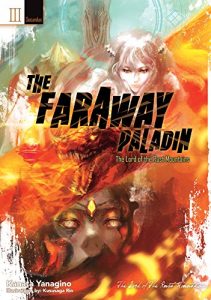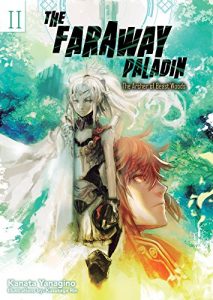By Kanata Yanagino and Kususaga Rin. Released in Japan as “Saihate no Paladin” by Overlap. Released in North America digitally by J-Novel Club. Translated by James Rushton.
I’m reviewing this as one giant book, but it actually came out as two books here, called ‘Primus’ and ‘Secundus’ – in fact, Amazon thinks that those are the titles, and forgot about the whole Rust Mountains thing. It works better to see them as one big book, though, which is what the author intended. The first volume simply stops, and the second picks up right where it left off – there’s no real attempt to separate them. As for the plot, our square-jawed hero and his elf friend are here to take down an ancient dragon, helped out by some old friends and some new dwarves, including one who becomes Williams’s squire, despite being of royal blood. He is told repeatedly that if he fights the dragon now he will die, and he should gain more power and influence by letting a few people be killed so he can take it down more easily. As you might imagine, that is not how William rolls.
William is the star of this series, and the narrative fits itself around him, meaning it too tends to be like he is – straightforward, a bit humorless, and painfully, PAINFULLY earnest. This is actually the main selling point of The Faraway Paladin, which is miles away from any other fantasy light novel we have out there – there’s not an ounce of cynicism or irony in it. William is Good and True, and he can do impossible things thanks to the help of his friends, the training of his parents, and MUSCLES, which he points out are awesome several times throughout the book. The closest we get to cynicism is the villain, who is a very well-done ancient dragon, and would very much like to tempt William into allying with him to that he can sow chaos. He should know better.
The book reads quickly, and the action sequences are very well done, with no confusion about what is happening at any time. I was a little annoyed with the introduction of a tsundere elf girl, whose sole purpose seems to be to get rid of the ho yay that existed between William and Menel (there’s a lot of teasing of William for not having found a girlfriend yet, further driving the point home). Al is a good addition to the cast – it fits that someone like William gets a squire that’s almost as serious-minded as he is, and the two work well together. The translation is also good, though the Kindle version I have has both the dragon and the Gods speaking in bold text, which can get very confusing when three of them are all speaking at once – perhaps one should have been italicized instead.
Again, if you want to read a light novel but are thoroughly sick of the cliches of the genre, this is an absolute must-read. It’s the Lord of the Rings starring Superman, basically. I look forward to seeing where it goes next.



